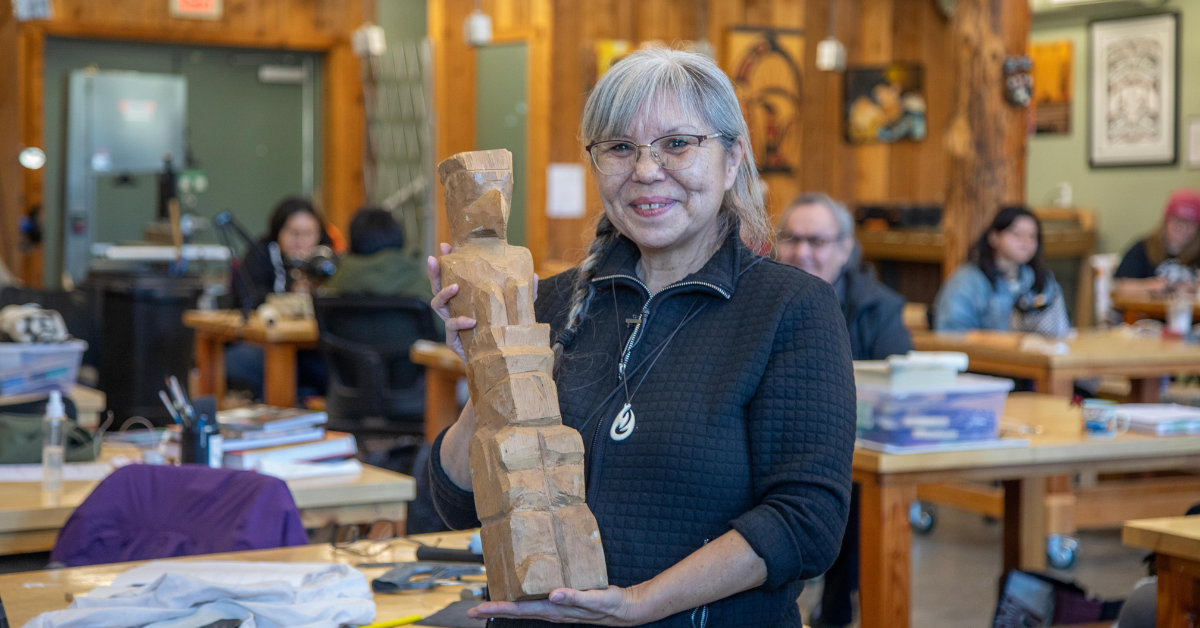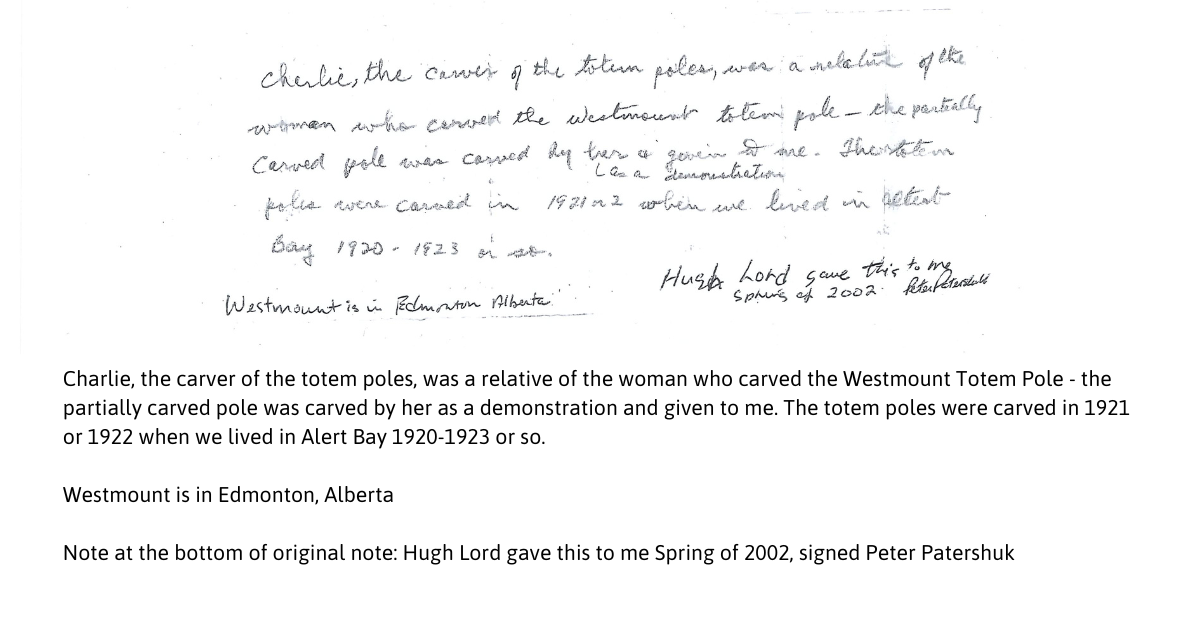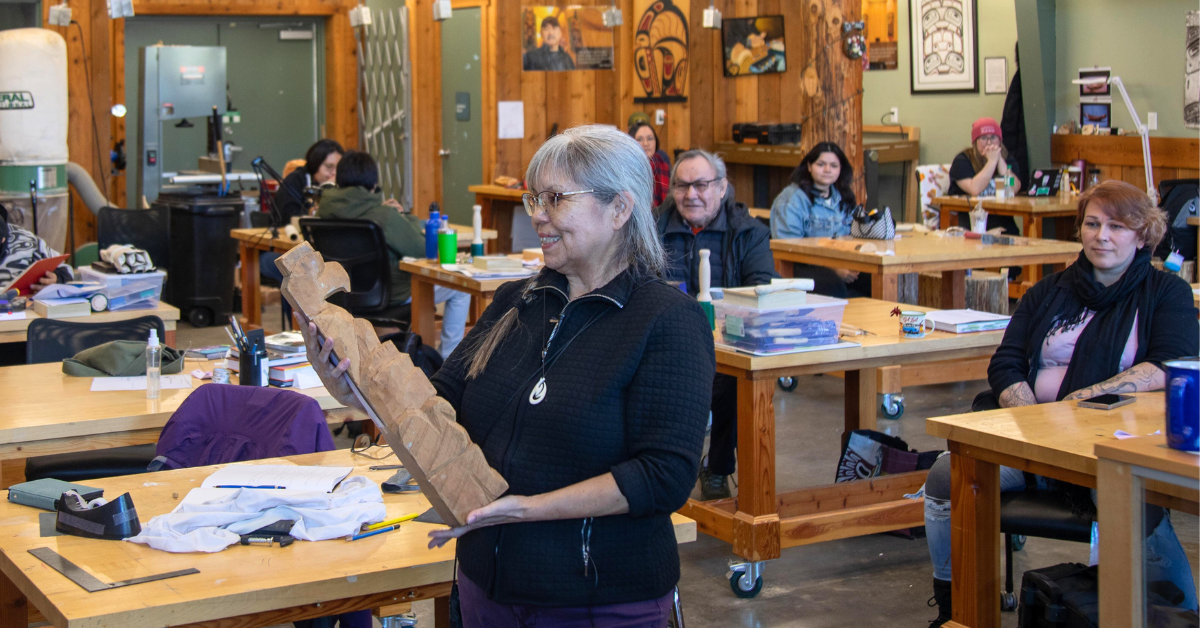
Lou-ann Neel holds the demonstration totem pole carved by her grandmother, Ellen Neel around 1930.
Terrace, BC – How often are First Nations art pieces from a century ago reunited with their creators? Earlier this year at Coast Mountain College, Kwakwaka’wakw artist Lou-ann Neel was reunited with a rough cut of a model totem pole carved almost 100 years ago by her grandmother, Ellen Neel.
In the spring of 2002, Peter Patershuk, a resident of northern Alberta, was gifted a carving from a colleague who had obtained it from his father who was a former worker for the Hudson’s Bay Company on Vancouver Island in the early 1990s. He approached Nakkita Trimble-Wilson, Freda Diesing School of Northwest Coast Art Instructor and Program Coordinator, in October 2023, thinking that she would know what to do with it. Nakkita wanted to ensure that the carving was returned to the artist’s family.
The carving came with a small hand-written note, from which Nakkita and Program Officer Kelli Louie determined that the carver was Kwakwaka'wakw artist Ellen Neel, and the pole was carved around 1930 when Ellen would have been 15 years old.
Nakkita then reached out to Ellen’s granddaughter, artist, designer, curator, and community advocate Lou-ann Neel who, at the time, was working to restore her grandmother’s totem poles. A few months later, in February 2024, Lou-ann travelled to the Freda Diesing School of Northwest Coast Art for the repatriation of the artwork.
School staff and faculty returned the small demonstration pole to Lou-ann, who spoke to the students about her history, career, family, and who her grandmother was as a female carver in the early 1900s.
Born in 1916, Ellen Neel began carving at age nine under the guidance of her grandfather, Charlie James, and continued her artistic practice the rest of her life.
Ellen Neel was a publicly recognized professional female carver of her era, going on to carve iconic totem poles for Stanley Park and the University of British Columbia, as well as other numerous totem pole commissions from around the world including Denmark, Korea, England, Australia, and the United States.
Lou-ann was only three years old when Ellen passed away, but she says her grandmother has played a huge role in her path as an artist and the artworks she creates.
“Everything I’ve done since I found out about my grandmother has been a very conscious effort to continue what she started. … She was not only a carver when many believed that women were not ‘allowed’ to carve … she was also a respected advocate and spokesperson for the rights of First Nations artists,” says Lou-ann.
Ellen was one of the only First Nations women to run a successful business in the arts in the 1940s and 1950s – she had her own gallery called ‘Totem Arts Studio’ in White Rock, BC. Through her studio, she trained her children, many of her relatives, and family friend Phil Nuytten, author of The Totem Carvers.
Lou-ann went on to speak about the rich and beautiful space of the Freda Diesing School, and the beautiful, powerful energy she felt here. One of the things that struck her most strongly was that there were at least as many women as men in the studio.
“We need to create spaces like this,” she said, “but we also have to remove some of those … colonial narratives that keep deterring and pushing our women away from this art form.”
Lou-ann says her hope for her family, community, and the women in First Nations communities who dreamt about carving but kept those dreams quiet is that they don't remain silent anymore. She hopes they come out and say, “I want to be a carver,” for whatever reason, even if only for the sake of feeling the wonderful energy Lou-ann feels when she carves. “I go far, far away,” she says, as does every carver she’s ever talked to. “We call it the zone.”
Lou-ann concluded her presentation by speaking about the “beautiful treasure” she held in her hands. “Treasure in the rough… I'm going to start calling it now.” She spoke of feeling as if her grandmother was sitting beside her, showing her the proportions she needs to learn. Hugging the pole, Lou-ann added that it feels as if lessons she might have received early on are starting to come back to her now.
While in Terrace, Lou-ann discussed cultural appropriation with an audience at the Terrace Art Gallery that included members from the host nation, artists, teachers, board members, city counsellors, and members of the gallery as well as students from the Freda Diesing program.
Also during her visit, at the request of Marianne Nicolson of the Dzawada’enuxw Nation, Lou-Ann viewed the two Talking Sticks which were in the possession of the City of Terrace at the council chambers for more than 60 years. During the visit, the Talking Sticks were confirmed to belong to the Dzawada’enuxw of Kingcome Inlet, and in June 2024, the City of Terrace brought Marianne and her sister Midori to Terrace to view them. In October 2024, the Mayor of Terrace returned the Talking Sticks to the community.
Ellen Neel, Freda Diesing, and the generations of some female carvers to follow will be recognized in the upcoming exhibition, “Curve! Women Carvers of the Northwest Coast,” this November 2024 at the Audain Museum in Whistler, BC.

Note attached to the demonstration totem pole from which Nakkita Trimble-Wilson and Kelli Louie determined the artist to be Ellen Neel. Note scanned by Kelli Louie.
.png)
Ellen Neel in her studio. Photo from the collection of Theo Neel.

Students in the Freda Diesing School of Northwest Coast Art watch the repatriation of the totem pole to Lou-ann Neel.
###
Media Contact:
Lucy Stanford
Interim Manager, Marketing and Communications
lstanford@coastmountaincollege.ca